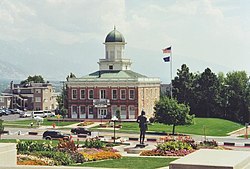Salt Lake City Council Hall
|
Old City Hall
|
|

Council Hall as seen from in front of the State Capitol c. 2002
|
|
| Location | Salt Lake City, Utah |
|---|---|
| Coordinates | 40°46′33″N 111°53′13″W / 40.77583°N 111.88694°WCoordinates: 40°46′33″N 111°53′13″W / 40.77583°N 111.88694°W |
| Built | 1864 |
| Architect | William H. Folsom |
| NRHP Reference # | 71000846 |
| Significant dates | |
| Added to NRHP | May 14, 1971 |
| Designated NHL | May 15, 1975 |
The Salt Lake City Council Hall is currently home to offices of the Utah Office of Tourism and the Utah Film Commission and is located on Capitol Hill in Salt Lake City, Utah. The building is historically important as the Old Salt Lake City Hall or just Old City Hall from 1866 to 1894.
Council Hall was originally Salt Lake City Hall, built to replace an older, smaller city hall completed just six years earlier on the eve of the Utah War, a standoff between Latter-day Saints ("Mormons") and federal troops. This small city hall was almost immediately inadequate for the growing city, so planning work on a new City Hall began by 1863.
Ground for the new hall was broken on February 8, 1864 under the direction of the prolific Salt Lake City architect William H. Folsom who was then the official architect for The Church of Jesus Christ of Latter-day Saints (LDS Church). Built at First South and 120 East (more on Salt Lake City’s coordinate system), sandstone for the structure was delivered from Red Butte Canyon on Utah's first chartered railroad. The well-furnished Greek revival building was completed at a cost of $70,000.
In January 1866, City Hall was dedicated by George Q. Cannon, a prominent LDS leader. Many other LDS leaders attended the dedication including Brigham Young. This is unsurprising because territorial and city politics were controlled by "The People's Party", which was the political organ of the LDS Church. The mayor at the time was People's Party member Abraham O. Smoot, the first of six mayors that would use the building. The People's Party would control Mayor's office until 1890 when the Liberal Party (territorial non-Mormon party) gained control of city government, partially because of anti-polygamy legislation which barred many Mormon polygamists from holding office.
...
Wikipedia


